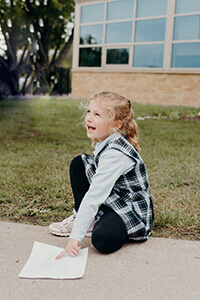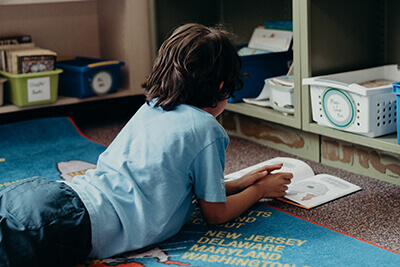April 30, 2020
 With virtual school now in place for the remainder of the school year, Mounds Park Academy wants to share some tips to help Lower School families thrive. These times are not easy for parents of younger students especially and MPA is committed to helping them navigate life through the end of the school year and perhaps even emerge stronger.
With virtual school now in place for the remainder of the school year, Mounds Park Academy wants to share some tips to help Lower School families thrive. These times are not easy for parents of younger students especially and MPA is committed to helping them navigate life through the end of the school year and perhaps even emerge stronger.
Build independence whenever you can
Our children have important work to do with virtual school and dealing with the current reality. We need them to persevere and be independent, much more than ever. Our Lower School students are incredibly tech savvy and in grades second through fourth, are likely able to navigate Schoology to access their lessons. Encouraging independence helps your child feel more empowered to complete tasks on their own, which means you can better attend to your own work, projects, or other children.
Give children of all ages input into their daily schedule
When children have some control of their day, they are invested in the activities and more inclined to cooperate. Ask for their input and implement what you can of their desired schedule for the day. Debbie LaChapelle, MPA PreK teacher, recommends using a whiteboard and having your child write the date, weather, and activities they would like to do during the day. This mirrors what students typically do in Lower School classrooms and keeps learning student-centered.
Institute a brief “morning meeting” to review daily tasks
Each morning, sit down with your child (or children) to review all of the assignments they need to complete that day and the activities they would like to do. Renee Wright, MPA Lower School director, shares, “A morning meeting will help your child prepare for the day, as it creates some structure for your child and you. Use this time to check their resources and determine if there is a Zoom meeting the day. If a ‘morning meeting’ does not fit within your family’s style, just be sure to start your child’s day with a moment of your undivided attention to set their focus and your expectations for the day.”
Use high-tech or low-tech strategies to track activities and assignments
Another recommendation is to use a KanBan board. This is a project management tool that tracks tasks and helps you visualize what needs to happen. Work with your child to write down the daily tasks on a Post-it Note. (If you have a pre-reader, you can draw pictures.) A KanBan board has separate columns that represent the different stages of completion. One example is that tasks start in a “parking lot” and then move to “doing.” Throughout the day your child moves the tasks from “parking lot” to “doing.” Then, depending on your child’s age or independence, you or the child move the Post-it Notes to the “done” column when the tasks are complete. This idea could also be achieved using the online project management tool Asana, with the project set up as a board. Some other digital child-friendly options recommended by Common Sense Media include Bear Focus Timer, Chore Pad, and Purp To-Do List & Goal Tracker. The novelty of a hands-on, engaging process may help your children (and you!) power through.
Encourage your child to “eat the frog”
There are different approaches to what you tackle first. Some people like to jump into what they love the most first and put off what they do not. Mari Espeland, MPA music teacher, recommends that children tackle the project they like the least or is the most challenging for them—the frog. So, she advises that you encourage your child to “eat the frog.” Then, it’s done for the day!
 Do something musical or artistic every day
Do something musical or artistic every day
Sing, dance around the living room, drum on a bucket, or rap about your day. Ms. Espeland says, “I would not be true to my subject area if I did not mention that every single day needs some music. Somehow it makes things better, even if you sing for just a few minutes.” Adding something musical or artistic does not need to be formal or one more thing for you to implement. It can be as simple as turning on some music while you’re making dinner or sketching.
Build in activities that focus on mindfulness
It is hard for your child to learn if they’re feeling anxious or worried. Check in with your child about how they are feeling about distance learning and about the changes related to COVID-19. Help make them feel safe, content, and secure mentally. Dr. Jules Nolan, MPA school psychologist, strongly recommends that families build in mindfulness and other relaxing activities that you and your child can do together. She finds Headspace, Mood Meter, Youper, and Wysa to be effective tools for young people. For more tips and resources about emotional health, revisit an earlier MPA blog article, “COVID-19: A Transformational Moment for Parents.” And, Dr. Nolan and the entire school counseling team is available to meet with families who are struggling.
Physical activity is more important than ever before
“Research in a growing scientific field called ecotherapy has shown a strong connection between time spent in nature and reduced stress, anxiety, and depression. Working from home, helping with virtual school, and completing all of the household chores can be exhausting, so it can be difficult to find the time and energy to be physically active,” shares Tim Sheehan, MPA physical education teacher. He recommends starting small with a 15-minute walk through the neighborhood, gradually increasing the distance, speed, and time spent walking. He also recommends living in the moment. “Try not to think about all of the things on your to-do list when your outside. Take that time, however long it might be, to focus on the beauty around you and let your batteries recharge.”
Reach out for help
Yamini Kimmerle, MPA fourth grade teacher, reminds us that “Teachers are here to support you and your children in any way they can. As educators, our goal continues to be to provide an enriching and rigorous curriculum to ensure the growth of each of our students. Our big dream is to create a virtual learning environment that allows each child to reach his or her fullest potential. What we can’t see, however, are the real challenges you and your child face unless you share them with us. Teachers, virtually or otherwise, do not want to overwhelm you or your student. When we hear from families that they would like more though, we will jump at the chance to enrich. At the same time, not everyone wants that or can meet those expectations given our new learning circumstances and that’s perfectly okay. At the end of this, if every child emerges with more independence, greater confidence, and academic growth on any level … we all win!”
MPA teachers and administration are here to support you—we’re all in this together. We know this is a challenging time for you, and we greatly appreciate all that you are doing to ensure your child’s success in virtual school.
What is working for you?
We encourage you to share what is helping you manage distance learning for your Lower School student in the comments below, via your Schoology grade-level parent group, or email communications@moundsparkacademy.org for inclusion in a future article or social media post. We all benefit from collective wisdom!